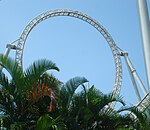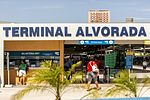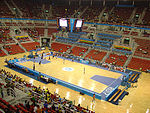Terra Encantada
1998 establishments in Brazil2010 disestablishments in BrazilAmusement parks closed in 2010Amusement parks in BrazilAmusement parks opened in 1998 ... and 3 more
Defunct amusement parksParks in Rio de Janeiro (city)Tourist attractions in Rio de Janeiro (city)

Terra Encantada was an amusement park in Barra da Tijuca, Rio de Janeiro, Brazil. It operated from 1998 to 2010. The park, which spanned over an area of 200 square kilometers, was dedicated to the celebration of Brazilian culture and its diverse origins, including indigenous, African, and European influences.
Excerpt from the Wikipedia article Terra Encantada (License: CC BY-SA 3.0, Authors, Images).Terra Encantada
Via Parque da Lagoa da Tijuca, Rio de Janeiro Barra da Tijuca
Geographical coordinates (GPS) Address Nearby Places Show on map
Geographical coordinates (GPS)
| Latitude | Longitude |
|---|---|
| N -22.986606 ° | E -43.363233 ° |
Address
Antigo Terra Encantada
Via Parque da Lagoa da Tijuca
22775-904 Rio de Janeiro, Barra da Tijuca
Rio de Janeiro, Brazil
Open on Google Maps










